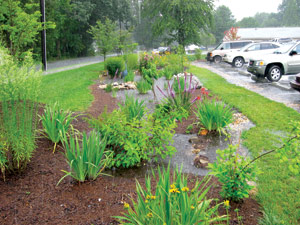The mere name seems to get folks excited: At the Organic Growers School's annual Spring Conference (held March 6 and 7 at UNCA), a roomful of people showed up to find out how to make a backyard rain garden. They might not have known exactly what it was, but they wanted one.

Extension Assistant Carter Cone of N.C. State, who has an office and experimental rain gardens at The North Carolina Arboretum, gave an exciting presentation titled "Wrangling Raindrops" (with Kenny Chesney ably serenading the audience in the background).
Wrangling raindrops sounds rather like herding cats, but in fact, it's easier than you'd think. The concept is simple: mimic Mother Nature. Storm-water runoff picks up pollutants and sediment as it washes over roofs, roads, parking lots, construction sites, et al. and then delivers those unwanted passengers to the nearest river (in this case, the French Broad or its tributaries). The goal of wrangling raindrops is to restore the natural water cycle to something like the way it worked before we started building all those things. Rain gardens do that by slowing down the rainwater, filtering it and directing more of it toward recharging our water table. By the time the runoff returns to our rivers, it's much cleaner and has cooled off enough to keep our trout happy.
Development and impervious surfaces go hand in hand. And the more such surfaces there are, the less efficiently the natural system can work. In the past, we've relied on things like gutters and downspouts, sidewalks and curbs, culverts and storm drains to funnel the untreated water back into our rivers. That worked better when the total volume of runoff was still relatively low. But today, with permeable surfaces in short supply and storm water carrying off an alarming amount of our topsoil, we have a real problem.
And that's where rain gardens come in. You know that place in your yard that stays wet and muddy for a day or more after a good rain? That's your storm-water runoff at work. It's where the rainfall that washes over your roof, your driveway, sidewalks and pathways collects; it's also where erosion happens and pollutants gather. Pesticides and fertilizers love to build up there too, eventually leaving an erosion trail through your yard to the nearest storm drain or water source.
The good news? That's also the best place for your rain garden. To make sure, a percolation test is recommended. Dig an 8-inch hole, fill it with water, and see how long it takes to drain. If it's not more than a day-and-a-half, you've found the perfect spot. Deciding how big and deep to make your garden does involve some calculations, but they're simple and easy; no Algebra II here. Just go to http://bae.ncsu.edu/topic/raingarden (where you'll also find plant lists, soil-amendment suggestions and more information about rain gardens).
Once you've done the math, you can start digging and planting (favoring native species, many of which are good at sucking up pollutants). After that, you just have to mulch it annually — something gardeners love to do.
The end result: You've beautified that ugly spot in your yard and helped wrangle some raindrops. How good does that feel?
Cinthia Milner lives in Leicester.
By the time the runoff returns to our rivers, it's much cleaner and has cooled off enough to keep our trout happy.


Before you comment
The comments section is here to provide a platform for civil dialogue on the issues we face together as a local community. Xpress is committed to offering this platform for all voices, but when the tone of the discussion gets nasty or strays off topic, we believe many people choose not to participate. Xpress editors are determined to moderate comments to ensure a constructive interchange is maintained. All comments judged not to be in keeping with the spirit of civil discourse will be removed and repeat violators will be banned. See here for our terms of service. Thank you for being part of this effort to promote respectful discussion.